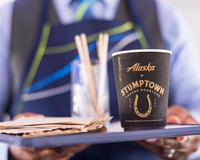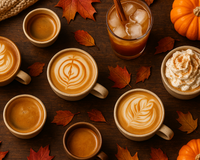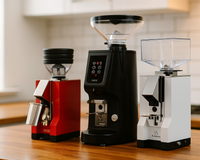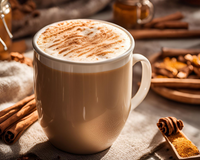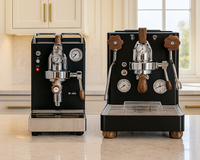The Cola or The Bean? The Ultimate Caffeine Showdown
Coffee and soda both contain caffeine, a natural stimulant that can help improve mental alertness and physical performance. However, the amount of caffeine in coffee and soda can vary significantly.
The Verdict: On average, an 8-ounce cup of coffee contains about 95 milligrams of caffeine, while a 12-ounce can of soda contains about 30-40 milligrams of caffeine.
However, the exact amount of caffeine can vary depending on the type of coffee or soda, as well as the brewing or manufacturing process.
Additionally, the effect of caffeine can also depend on individual factors such as age, weight, and sensitivity to caffeine. Some people may be more sensitive to caffeine and may experience more pronounced effects, such as jitteriness or insomnia, even with smaller amounts of caffeine.
Related Article: Here's how much caffeine is in a McDonald's Iced Coffee
Why should you care?
It's a fair question to ask why someone should care about the comparison between caffeine in coffee and soda. Here are a few reasons why this topic might be of interest to your readers:
-
Health: Many people are concerned about their health and want to make informed choices about what they consume. Understanding the amount of caffeine in coffee vs. soda can help readers make more informed decisions about their caffeine intake.
-
Energy and Productivity: For many people, caffeine is an important part of their daily routine. Understanding which beverage provides a greater caffeine boost can help readers choose the beverage that best meets their needs.
-
Taste: Some people simply enjoy the taste of coffee or soda and may be interested in understanding the differences between the two beverages.
-
Environment: The production and disposal of coffee cups and soda cans can have a significant impact on the environment. By understanding the differences between coffee and soda consumption, readers may be able to make choices that are more environmentally sustainable.
The amount of caffeine in coffee vs soda

When it comes to caffeine content, there can be a lot of variation between different types of coffee and soda. However, as a general guideline, an 8-ounce cup of coffee typically contains around 95 milligrams of caffeine, while a 12-ounce can of soda contains around 30-40 milligrams of caffeine.
It's worth noting that the caffeine content of coffee can vary depending on the type of coffee bean, the method of brewing, and the size of the serving. For example, a shot of espresso typically contains around 63 milligrams of caffeine, while a 16-ounce cup of brewed coffee from a coffee shop may contain up to 330 milligrams of caffeine.
Similarly, the caffeine content of soda can vary depending on the brand and flavor. Some types of soda, such as cola, tend to contain more caffeine than others. For example, a 12-ounce can of Coca-Cola contains around 34 milligrams of caffeine, while a 12-ounce can of Mountain Dew contains around 54 milligrams of caffeine.
It's also worth noting that some brands of coffee and soda may contain more caffeine than others. For example, some brands of energy drinks can contain upwards of 200 milligrams of caffeine per serving, while some types of coffee may contain as little as 30 milligrams of caffeine per serving.
Related Article: Does coffee iced cream have caffeine?
Caffeine counts may vary by brand

Caffeine counts may vary between brands due to several factors, including the type of product, the source of caffeine, the serving size, and the manufacturing process. Here are some factors that can contribute to variations in caffeine counts between brands:
-
Product type: Different types of products, such as coffee, tea, energy drinks, and soft drinks, can have different caffeine counts. For example, energy drinks are typically designed to contain high amounts of caffeine, while soft drinks usually have lower caffeine counts.
-
Source of caffeine: The source of caffeine can also vary between brands. Some brands use natural sources of caffeine, such as coffee or tea, while others may use synthetic sources of caffeine.
-
Serving size: The serving size of a product can also affect its caffeine count. For example, a small cup of coffee may contain less caffeine than a large cup of coffee, even if both are from the same brand.
-
Manufacturing process: The manufacturing process can also impact the caffeine count of a product. For example, some brands of coffee may use different roasting methods or grinding techniques, which can affect the amount of caffeine that ends up in the final product.
Additionally, it's worth noting that some brands may add extra caffeine to their products for marketing or flavor purposes. For example, some brands of energy drinks may contain more caffeine than is typically found in coffee or soda.
Related Article: Coffee vs. Tea: Which is better for your health?
The effects of caffeine on the body
Whether you're a coffee lover or a soda aficionado, chances are you've experienced the effects of caffeine on your body at one time or another. But how exactly does caffeine work, and what are its effects on the body?

How caffeine effects your body
Caffeine is a natural stimulant that can have a range of effects on the body. Here are some ways caffeine can impact your body:
-
Increased alertness and concentration: Caffeine works by blocking adenosine, a chemical in the brain that promotes sleep and relaxation. By blocking adenosine, caffeine can help increase alertness and concentration, making it a popular choice for those who need to stay awake and focused.
-
Boosted metabolism: Caffeine can also increase metabolism by stimulating the central nervous system, leading to an increase in heart rate and blood pressure. This can help to burn calories faster and may be beneficial for weight loss.
-
Improved physical performance: Caffeine has been shown to improve physical performance by reducing fatigue and increasing endurance. This is why many athletes use caffeine as a performance-enhancing drug.
-
Increased anxiety and restlessness: While caffeine can be beneficial in small doses, consuming too much caffeine can lead to feelings of anxiety, jitteriness, and restlessness.
-
Disrupted sleep: Because caffeine can stay in the body for several hours, consuming caffeine too late in the day can disrupt sleep patterns and lead to difficulty falling asleep or staying asleep.
-
Dehydration: Caffeine is a diuretic, which means it can cause the body to lose water and lead to dehydration if consumed in large amounts.
Related Article: Is one Starbucks a day bad for you?
Potential side effects of caffeine
Consuming too much caffeine can lead to a range of side effects, including:
-
Anxiety and restlessness: Caffeine can increase the levels of the stress hormone cortisol in the body, which can lead to feelings of anxiety and restlessness.
-
Insomnia and disrupted sleep: Because caffeine can stay in the body for several hours, consuming caffeine too late in the day can disrupt sleep patterns and lead to difficulty falling asleep or staying asleep.
-
Increased heart rate and blood pressure: Caffeine can stimulate the central nervous system, leading to an increase in heart rate and blood pressure.
-
Dehydration: Caffeine is a diuretic, which means it can cause the body to lose water and lead to dehydration if consumed in large amounts.
-
Digestive issues: Caffeine can irritate the lining of the stomach and cause digestive issues such as nausea, vomiting, and diarrhea.
-
Headaches: In some people, consuming too much caffeine can trigger headaches or migraines.
-
Dependence and withdrawal: Regular consumption of caffeine can lead to dependence, and sudden cessation of caffeine intake can lead to withdrawal symptoms such as headaches, fatigue, and irritability.
Which is better: coffee or soda?
Whether coffee or soda is "better" depends on individual preferences and needs. Here are a few factors to consider when choosing between coffee and soda:
-
Caffeine content: As we've discussed, coffee generally contains more caffeine than soda. If you're looking for a greater caffeine boost, coffee may be a better choice.
-
Taste: Taste is subjective, and some people simply prefer the taste of coffee or soda. If you're choosing between the two based on taste, it ultimately comes down to personal preference.
-
Sugar content: Many types of soda contain high amounts of sugar, which can lead to negative health effects if consumed in excess. If you're concerned about sugar intake, coffee may be a better choice.
-
Nutritional content: Depending on how you take your coffee or what type of soda you consume, there may be some nutritional differences between the two. For example, black coffee is very low in calories, while some types of soda can be high in calories and artificial ingredients.
-
Environmental impact: The production and disposal of coffee cups and soda cans can have a significant impact on the environment. If you're concerned about environmental sustainability, you may want to consider the environmental impact of your choice.
In Conclusion
Important points covered in this post:
-
The average amount of caffeine found in an 8-ounce cup of coffee is around 95 milligrams, while a 12-ounce can of soda contains around 30-40 milligrams of caffeine.
-
Caffeine can have a range of effects on the body, including increased alertness and concentration, boosted metabolism, improved physical performance, anxiety and restlessness, disrupted sleep, and dehydration.
-
Whether coffee or soda is "better" depends on individual preferences and needs, and factors to consider when choosing between the two include caffeine content, taste, sugar content, nutritional content, and environmental impact.


